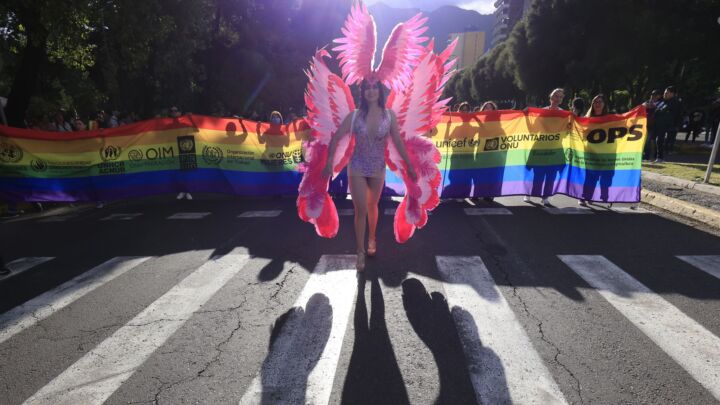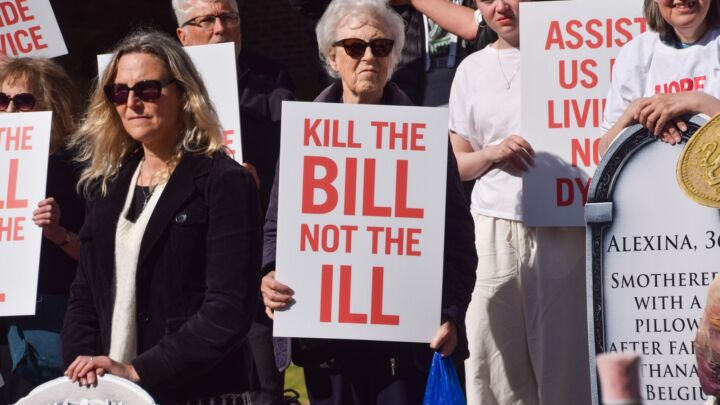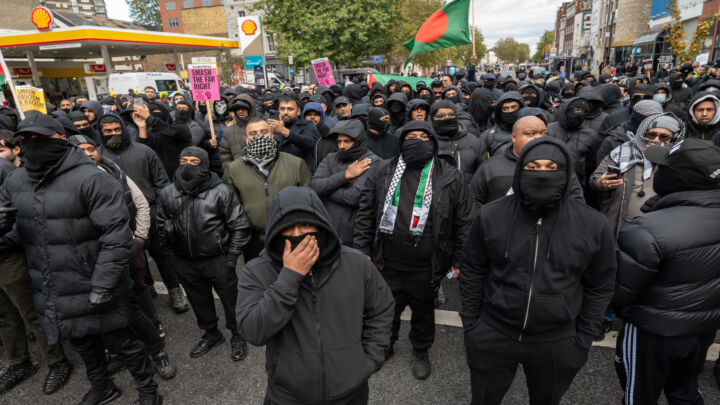Eco-dread is a luxury belief we can no longer afford
Climate-change hysteria is a menace to the lives and interests of working people.

Want unlimited, ad-free access? Become a spiked supporter.
Here we go again. The Intergovernmental Panel on Climate Change (IPCC) has issued a new document – the final part of its mammoth sixth report – and we all know what that means. More doomsday porn in the papers. More shroud-waving from eco-agitators. More warnings of imminent apocalypse. The climate cult has not disappointed. Our world is on the ‘brink of catastrophic warming’, cries the Washington Post. We’re headed for ‘climate disaster’, warns the BBC. The ‘climate time bomb’ is ticking, says UN secretary general António Guterres. In short, the countdown to doom continues. Unless we repent of our eco-sins, we’ll cause the heat death of our celestial home.
It’s always like this. Every IPCC report gives rise to Revelations-style hysteria in elite circles. Its 2021 report – which gave a ‘code red’ warning to humankind – was heralded as a vision of the horrors that await humanity if we do not drastically cut our carbon emissions. The future will be ‘some kind of hell on Earth’, said an Oxford professor. Behold the ‘climate crimes’ of our species, wailed the Guardian, like a modern-day version of those potty millenarian preachers of old. The Biblical vibe was palpable. ‘With raging wildfires, floods and pandemics, it seems like End Times – and it’s our own damned fault’, said a writer for the Hill. This view of humankind as being one new coal power station away from doom has found expression in response to the latest IPCC report, too. Humanity is on ‘thin ice, and that ice is melting fast’, quipped Guterres.
It all just washes over you after a while, doesn’t it? They’re the boy who cried apocalypse. Though at least the wolf in that fable did turn up eventually. I confidently predict that the eco End Times feverishly envisioned by the likes of Extinction Rebellion – who insist ‘billions will die ’ – will never materialise. Indeed, the IPCC says nothing even remotely as apocalyptic as that. As Michael Shellenberger has pointed out, pore over the thousands of pages of IPCC analysis and nowhere will you find the claim that ‘life on Earth is dying’. ‘No credible scientific body has ever said climate change threatens the collapse of civilisation, much less the extinction of the human species’, says Shellenberger.
As to the now mainstream belief that climate change will intensify ‘weather of mass destruction’, causing more deaths in natural disasters, ‘the science’ on that is also far from clear-cut. The IPCC only says it’s ‘likely’ that human influence is driving some instances of heavy rainfall, for example. It expresses only ‘medium confidence’ that climate change has impacted on water availability in parts of the world. Confidence is ‘low’, it says, that flooding on a global scale has been shaped by man’s impact on the climate. What we can be confident of, though, is that fewer people are perishing in natural calamities. As Shellenberger says, ‘In 1931, 3.7million people died from natural disasters. In 2018, just 11,000 did.’ And that brilliant decline in death happened at a time when the human population quadrupled. Maybe that ice we’re skating on isn’t so thin after all.
Speaking of ice, recent studies suggest there has been a stabilisation and even growth in the Antarctic ice shelf, that thing we’re constantly told is disappearing thanks to dastardly mankind. The Great Barrier Reef is doing pretty well too, in defiance of the numerous obituaries eco-doomsters wrote for that natural wonder (a 2014 piece in the Guardian was literally titled ‘The Great Barrier Reef: an obituary’). The ozone layer is recovering nicely. Green hysterics are wrong about everything. The End of Days that keeps them up at night never materialises. No wonder Greta Thunberg deleted that tweet in which she shared the harebrained claim that ‘climate change will wipe out all of humanity’ if we don’t ‘stop using fossil fuels over the next five years’. A tweet she posted… five years ago.
Let’s be clear about this: nothing that resembles science says that all of humanity will be wiped out unless we stop using fossil fuels. That is delirium, a frenzy of existential fear, a medieval-style dread of terrible heavenly punishment for our hubris, which is about as far from science as you can get. There was a line in the Guardian this week about the IPCC’s latest report that made it pretty clear that there’s a difference between what the IPCC says about climate change and what the doom-addicted media say about climate change. This vast tract ‘took hundreds of scientists eight years to compile and runs to thousands of pages’, said the Guardian, but it can be ‘boiled down to one message: act now, or it will be too late’. Call me a cynic, but I reckon a lot of things are lost in translation when thousands of pages of complex scientific discussion are ‘boiled down’ to a juvenile one-line slogan designed to panic the masses into behaviour change.
This is not to let the IPCC off the hook. Its dense tomes might be free of XR-style fever dreams about billions of deaths and Greta-style warnings of all of humanity being wiped out. But the IPCC’s treatment of climate change as the gravest challenge facing mankind is a problem. It has a warping effect on our political priorities, implicitly downgrading issues like global poverty or deaths from disease by dragging our gaze, always, to climate. And it lends legitimacy to the crankier bell-tolling of the green movement. Indeed, those one-liners spun by António Guterres – ‘code red for humanity’, ‘the alarm bells are deafening’, ‘humanity is on thin ice’ – do nothing to challenge the terror-mongering of green talking heads, and a lot to inflame it.
Indeed, the latest IPCC document makes a preposterous demand of developed countries – that they should aim for Net Zero by 2040 rather than 2050. Apparently we should devote ourselves to achieving that expensive, anti-industry, anti-jobs goal of Net Zero 10 years earlier than planned. Here is the entire problem with the climate-change obsession – it’s the luxury belief we can no longer afford. This new IPCC report, like its 2021 predecessor, has landed in a time of crisis. In our post-lockdown era of soaring inflation and energy shortages, we can ill-afford to carry on indulging the late-bourgeois fantasy that modernity is a planet-killing force. We can no longer nod along to this petrified ideology that bears a great deal of responsibility for today’s energy problems and for the stalling of development in poorer parts of the world. Luxuriant apocalypticism, with its provision of a sense of mission to our lost elites, might have been just about tolerable in good times – it’s a non-starter in bad times.
The true conflict today is not between humankind and Mother Earth. It’s between the needs of ordinary people and the fantasies of a global elite that dolls up its loss of faith in industry and progress as ‘climate-change activism’. That tension will explode soon. We should hope it does, anyway.
Brendan O’Neill is spiked’s chief political writer and host of the spiked podcast, The Brendan O’Neill Show. Subscribe to the podcast here. And find Brendan on Instagram: @burntoakboy
Picture by: Getty.
£1 a month for 3 months
You’ve hit your monthly free article limit.
Support spiked and get unlimited access.
Support spiked – £1 a month for 3 months
spiked is funded by readers like you. Only 0.1% of regular readers currently support us. If just 1% did, we could grow our team and step up the fight for free speech and democracy.
Become a spiked supporter and enjoy unlimited, ad-free access, bonus content and exclusive events – while helping to keep independent journalism alive.
———————————————————————————————————————————–
Exclusive January offer: join today for £1 a month for 3 months. Then £5 a month, cancel anytime.
———————————————————————————————————————————–
Monthly support makes the biggest difference. Thank you.










Comments
Want to join the conversation?
Only spiked supporters and patrons, who donate regularly to us, can comment on our articles.